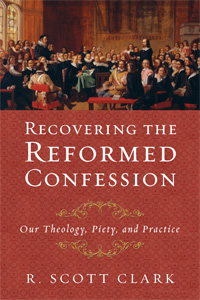One of the chapters in RRC is about how we relate to our confession(s). Well, the whole book is about how we relate to our confession(s) but this chapter is devoted specifically to how we subscribe them. This is a big issue. . . . Continue reading →
good faith
Progress Or Regress?
So, since our 1973 founding, the PCA has “progressed” from “committed without reservation” to our Standards, to a “good faith subscription” approach that has opened the PCA’s door to paedocommunion, intinction, female pseudo-officers, Federal Vision, theistic evolution (e.g., Biologos), et al, all . . . Continue reading →
From “Insofar As” To “Good Faith:” The Slope To The Mainline
Introduction There is what PCA RE Brad Isbell calls a “quiet crisis” in the PCA. PCA TE Jon Payne says “the future doesn’t look good for the PCA.” The presenting issue just now is so-called “Side B” or “Gay Christianity.” On this . . . Continue reading →
Good Guys, Bad Guys, And A Missing Category
The largest NAPARC denomination, the Presbyterian Church in America (PCA) is in the throes of an identity crisis. Founded by Southern Presbyterians and emerging out of the old PCUS (the Southern version of the Presbyterian mainline) it has always been more more broadly . . . Continue reading →
The Use Of Images Is An Indicator Of The Functional Authority Of The Standards In The PCA
When the Westminster Assembly (1643–52), which was composed of Episcopalians, Congregationalists, and Presbyterians, deliberated on the moral law of God, they agreed on with the church of all ages and times on the abiding validity of God’s moral law. In their Confession (19.5) . . . Continue reading →
Is It “Fundamentalist” To Forbid The Teaching Of Exceptions To The Standards?
David Cassidy says it is:
Continue reading



